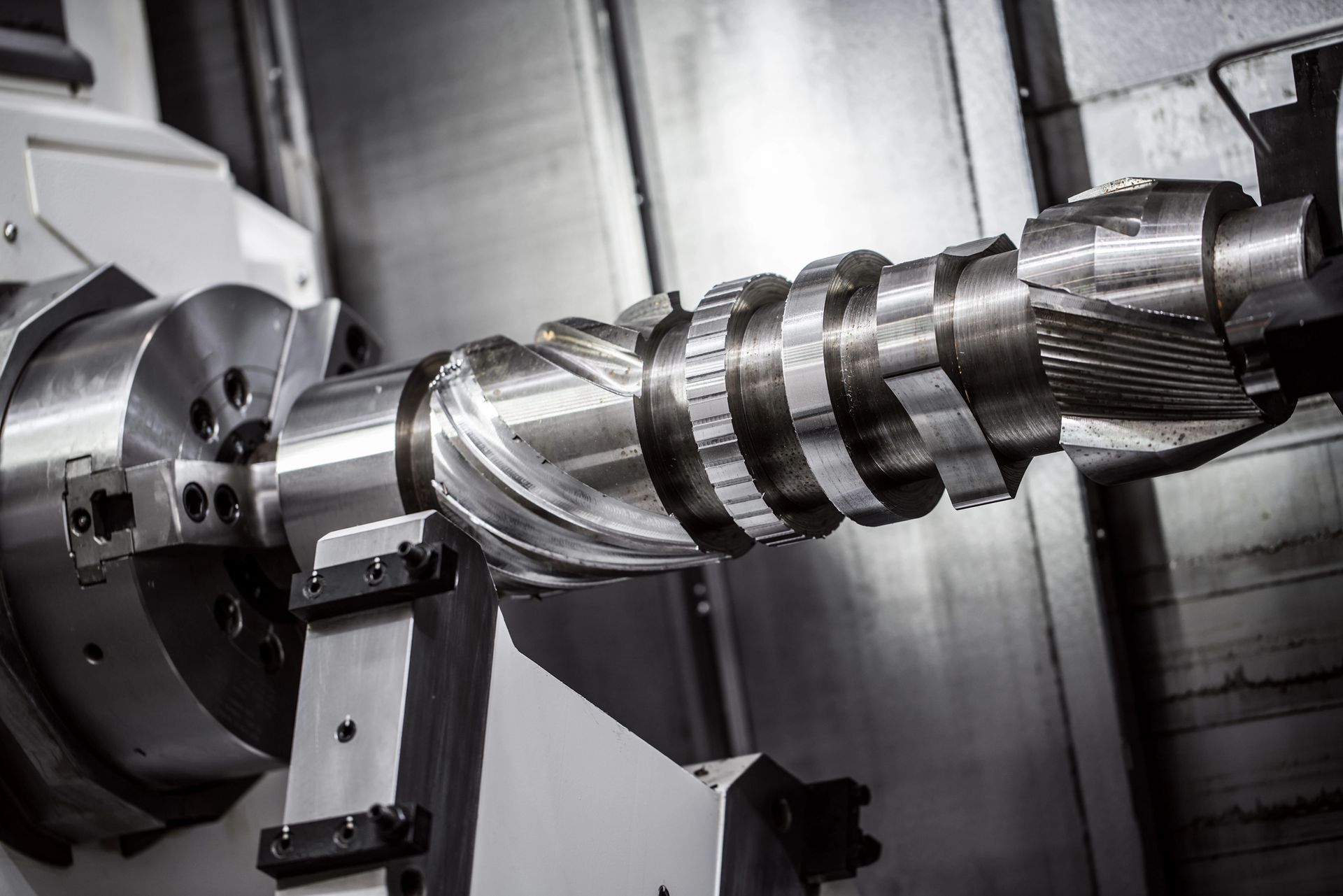What is CNC Machining? Key Benefits and Applications in the Modern Manufacturing Landscape
Manufacturing has revolutionized what’s possible when machining components. This innovation helped upgrade many tasks from manual, labor-intensive processes to highly automated, precise production.
Understanding CNC machining is vital in today’s manufacturing landscape, where efficiency, precision, and adaptability are required for lasting success. Industries that demand components meet tight tolerance and function reliably are increasingly choosing CNC machining over other methods.
So, let’s dive into the fundamental aspects of CNC, its advantages, and its far-reaching applications to demonstrate why it’s become such a cornerstone of modern manufacturing.

What is CNC Machining?
CNC machining uses pre-programmed software to control machinery and tools. This manufacturing method began in the post-WWII era and has continually evolved alongside technological advances.
Instead of manual operation, CNC machines follow programmed instructions to perform complex tasks like cutting, shaping, and drilling with high precision.
After the design is created using CAD software, CAM software translates the design into specific commands for CNC machines. These machines control multiple axes, allowing for complex, high-precision operations, such as:
- Lathes are used to rotate materials and cut them into the desired shape.
- Mills enable complex cutting, drilling, and tapping processes.
- Routers are primarily used for cutting wood, plastics, and softer metals.
Some CNC machines offer all of these capabilities, while others have a narrow focus. Ultimately,
CNC machining enables multiple complex tasks while offering fast turnaround times and cost-effectiveness.
Key Benefits of CNC Machining
Why has CNC machining become so popular and even necessary in some industries? This manufacturing method offers distinct benefits that are reflected in the final product. So, we’ll explore the benefits that have made CNC machining appealing to many use cases.
Precision and Accuracy
CNC machines are known for their precision, critical in industries where even the smallest error can lead to catastrophic failure. CNC machines allow for incredibly fine measurements and repeatedly replicate exact specifications while maintaining tight tolerances.
Several industries demand precision to ensure safe, high-quality end products. The aerospace industry relies on CNC to manufacture parts where precision ensures both safety and performance. Additionally, CNC machines create critical vehicle components, ensuring consistent quality and fit for mass production.
Efficiency and Productivity
CNC machining enhances efficiency by automating production processes. Once programmed, machines can work continuously and require minimal human oversight. As a result, CNC machines increase production speed while reducing the risk of human error.
With CNC machines operating continuously, manufacturers can produce more parts in less time. This continuous production flow boosts productivity, leading to quicker turnaround times and higher output without compromising quality.
Versatility and Flexibility
CNC machines can work with various materials, including metals, plastics, and composites. These machines' ability to handle diverse materials makes them adaptable to industries with different demands. A CNC machine can quickly shift between different product designs, allowing manufacturers to create custom parts or switch between production runs with minimal downtime.
CNC machines can adapt to specific designs, sizes, and tolerances, whether producing a small batch or a large-scale order. This versatility makes them invaluable for industries like defense, where customization is often essential.
Cost-Effectiveness
CNC systems require a significant initial investment but deliver long-term savings. CNC systems help manufacturers cut costs over time by reducing labor costs and minimizing material waste. Fortunately, organizations can work with specialized CNC manufacturers to avoid the initial investment and still appreciate the benefits it provides.
CNC systems are highly accurate, significantly reducing the likelihood of manufacturing defects. Fewer errors mean less material waste and fewer hours spent correcting mistakes, further driving cost efficiency.
Top Applications of CNC Machining in Different Industries
CNC machining is crucial throughout many different industries. The core benefits we explored are valuable in everything from oil and gas to aerospace. Any component that needs to be precisely manufactured to create durable results can likely benefit from CNC machining.
So, let’s break down some of the top use cases for CNC machining in various industries to demonstrate what this manufacturing technology is capable of.
Automotive Industry
CNC machining plays a critical role in the automotive industry by enabling the production of high-precision parts and components, including engine parts, transmission systems, and various structural elements.
The automotive industry also benefits from CNC's rapid prototyping capabilities, allowing quicker development cycles. Once the design is perfected, CNC machines can shift to mass production, maintaining the same level of precision across thousands of units.
This capability can go far in increasing overall operational efficiency in the automotive industry, where being the first to market can make a significant difference.
Aerospace Industry
In the aerospace sector, precision is necessary to meet safety standards. CNC machining is indispensable in aerospace when creating high-quality components that withstand extreme forces while remaining lightweight. Components like turbine blades, landing gear, and fuselage are often made using CNC machines.
CNC machines create intricate components for aircraft engines and bodies, such as the blades in a jet turbine or structural supports. These parts are crucial to performance and safety, requiring precise design and durable components.
Defense Industry
The defense industry requires rugged, durable components with exacting tolerances. CNC machining produces everything from vehicle armor to weapon systems with the precision and consistency necessary for high-stakes applications.
CNC machines can create parts for military-grade vehicles that must meet strict standards for durability and performance. Additionally, this form of manufacturing can produce precise components for firearms, missile systems, and other defense equipment.
Oil and Gas Industry
In the oil and gas sector, components must be precise and capable of enduring harsh conditions, including extreme temperatures and pressures. CNC machining is essential for producing reliable parts for pipelines, drilling equipment, and offshore rigs.
Durability in Harsh Environments: CNC machines ensure the production of durable, precision parts, such as valves, fittings, and drilling tools, which are crucial for maintaining the integrity of oil and gas infrastructure in demanding environments.
Future Trends in CNC Machining
Technological innovations and a greater focus on automation mark the future of CNC machining. Adopting 5- and 9-axis machining allows for even more complex and precise manufacturing processes, enabling manufacturers to create intricate parts with fewer setups.
As CNC integrates with Industry 4.0, it plays a vital role in the evolution of smart factories. IoT (Internet of Things) and AI (Artificial Intelligence) in CNC systems can improve efficiency, productivity, and precision.
Automation will also continue to reduce the need for human intervention, making manufacturing processes more efficient and scalable. CNC's role in this smart manufacturing ecosystem will only grow as technology advances, helping to create a holistic, efficient operation.
Partner with GN for Reliable, Cost-Effective CNC Machining
CNC machining is a cornerstone of modern industrial manufacturing, providing precision, efficiency, and versatility across various sectors. This technology’s ability to automate complex tasks, handle diverse materials, and reduce errors has made it an indispensable part of the manufacturing landscape.
CNC machines enable the production of critical components with high accuracy and consistency for industries ranging from aerospace to oil and gas. As the technology continues to evolve, CNC's role in shaping the future of manufacturing will only become more significant.
Whether you're in the automotive industry or looking for innovative manufacturing solutions, CNC machining offers the precision and flexibility needed to stay competitive in today's market.






